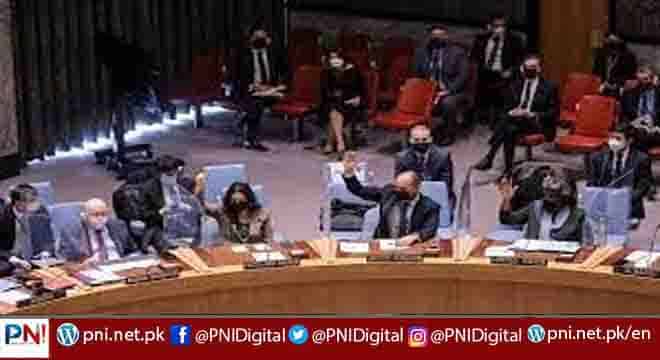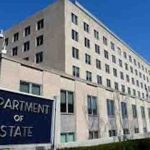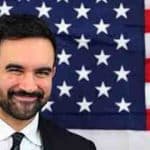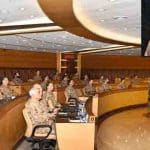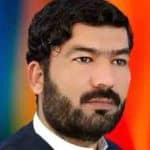UNITED NATIONS, Jan 31 (APP):The United States and Russia had a verbal duel Monday at the U.N. Security Council over the Ukraine issue, with Washington accusing Moscow of endangering peace by deploying troops on Ukraine’s borders while the top Russian diplomat here dismissed what he called fear-mongering and forcing an unnecessary debate — a point China later echoed.
The heated, at times angry, rhetoric at U.N. headquarters in New York came as some 100,000 Russian troops are reportedly positioned along Ukraine’s eastern border with Russia as well as its northern border with Belarus.
The U.S. called the Security Council meeting, saying it fears that an invasion is imminent.
Russia’s actions strike at the very heart of the U.N. Charter, U.S. Ambassador to the U.N. Linda Thomas-Greenfield told the 15-member Council. This is as clear and consequential a threat to peace and security as anyone can imagine.
She added: Russia’s aggression today not only threatens Ukraine. It also threatens Europe. It threatens the international order.
Russia objected to the open meeting from the outset, immediately demanding a procedural vote seeking to prevent it, which failed.
This is not only unacceptable interference in the domestic affairs of our state, but also an attempt to mislead the international community on the situation in the region, and also the reason for the current global tensions, said Russian U.N. Ambassador Vasily Nebenzya. We are being asked to convene a Security Council meeting on unfounded accusations that we have refuted frequently.
Russia and China voted against holding the meeting, while India, Gabon and Kenya abstained. All other 10 Council members, including Norway, France, the US, the UK, France, Ireland, Brazil and Mexico, voted in favour of the meeting going through.
The Council needed only 9 yes votes for the meeting to go ahead. With 10 Council members voting in favour, the Council went ahead with the meeting on the situation on the Ukraine border.
U.S. President Joe Biden and other Western leaders have warned that a Russian attack on Ukraine could come at any moment. Russia has repeatedly denied any hostile intent while insisting the troops are simply conducting exercises.
The U.S. decided to push for the public U.N. debate before Russia takes over the Security Council presidency tomorrow for the month of February.
This body is charged with upholding an order that if it stands for anything it stands for the principle that one country cannot simply redraw another country’s borders by force, Ms. Thomas-Greenfield said. We continue to hope Russia chooses the path of diplomacy over the path of conflict in Ukraine. But we cannot just wait and see.
Nebenzya, the Russian ambassador, however, hit back, disputing even the number of troops stationed on the border.
They themselves are whipping up tensions and rhetoric and provoking escalation, he said. You’re waiting for it to happen as if you want to make your words become a reality. This despite the fact that we are constantly rejecting these allegations.
Nebenzya continued: Where did you get the figure of 100,000 troops that are deployed as you said on the Russian Ukrainian border, although that is not the case? We have never cited that figure, we’ve never confirmed that figure.
China said it agreed that the meeting should not have been called.
The reason why the U.S. was asking the council to hold this open meeting was that Russia’s deployment of troops along the Ukrainian border posed a threat to international peace and security, said Chinese U.N. Ambassador Zhang Jun. China cannot align itself with this point of view.
Zhang explained China’s position: Russia has repeatedly stated that it has no plans to launch any military action. And Ukraine has made it clear that it does not need a war. Under such circumstances, what is the basis for the country’s concern to insist that there may be a war?
Kenya called on the big powers to work out their issues and not cause problems for others.
When elephants fight, said Kenyan U.N. Ambassador Martin Kimani, it is the grass that suffers.
Addressing the meeting, the United Nations political affairs chief reiterated the UN Secretary-General’s appeal that there can be no alternative to diplomacy and dialogue.
Highlighting the complex and long-standing security concerns and threat perceptions that have been raised, the Under-Secretary-General for Political and Peace building Affairs, Rosemary DiCarlo, repeated that any military intervention involving Russia, or NATO alliance forces which are also now on high alert, must be averted.
She said that any incursion by one State on another’s territory would be against international law and the United Nations Charter.
According to her, it is reported that in addition to the 100,000 troops on Russian soil along Ukraine’s border, unspecified numbers of Russian troops and weaponry are also reportedly being deployed to Belarus ahead of large-scale joint military exercises in February on the borders with Ukraine, Poland and the Baltic States.
NATO members are also reportedly planning additional deployments in Eastern European member states, and NATO has advised that 8,500 troops are now on high alert.
Accusations and recriminations among the various actors involved in the ongoing discussions have created uncertainty and apprehension for many that a military confrontation is impending, she said.
Ms. DiCarlo also welcomed the ongoing diplomatic discussions, saying the UN hopes that a successful de-escalation will strengthen peace and security in Europe.
These efforts include a 13 January meeting in Vienna held by Organization for Security and Co-operation in Europe (OSCE) and a 21 January meeting between the US Secretary of State, Antony Blinken, and Russian Foreign Minister, Sergey Lavrov, in Geneva.
On 26 January, a meeting of the Normandy format (a group with France, Germany, Russia, and Ukraine created in 2014 to address the conflict in Ukraine) was held in Paris.
Another meeting of the Normandy format is scheduled to take place in Berlin during the second week of February.
For the UN political chief, this second encounter is another sign that diplomacy can work.
Still, we remain greatly concerned that, even as these efforts continue, tensions keep escalating amid a dangerous military build-up in the heart of Europe, she warned.
She urged all actors to refrain from provocative rhetoric and actions to maximize the chance for diplomacy to succeed.
The UN Under-Secretary-General also said that UN agencies would remain committed to deliver on their mandates in Ukraine.
Safe, unimpeded humanitarian access must be respected, under any circumstances, to provide support to the 2.9 million people in need of assistance, with the majority in non Government-controlled areas, she said.
The UN Human Rights Monitoring Mission also continues to document civilian casualties, as the conflict enters its eighth year.
The conflict, which erupted shortly after Russia annexed Crimea in March 2014, has claimed the lives of more than 14,000 people, including approximately 3,000 civilians, and injured more than 7,000 civilians, according to the Office of the UN High Commissioner for Human Rights (OHCHR).
In addition, some 1.5 million people have been internally displaced since the outbreak of the conflict, according to Ukrainian government figures.
No one is watching the current diplomatic efforts more than the people of Ukraine, said Ms. DiCarlo, noting that they have endured a conflict that has taken over 14,000 lives since 2014 and that tragically is still far from resolution.
For her, it is painfully obvious that any new escalation in or around Ukraine would mean more needless killing and destruction.
Ms. DiCarlo also believes that any escalation or new conflict would deal another serious blow to the architecture so painstakingly built up over the last 75 years to maintain international peace and security.
Follow the PNI Facebook page for the latest news and updates.


